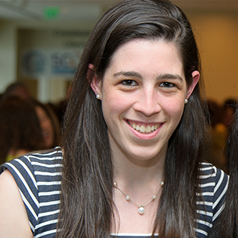2013
When I was in the seventh grade at Rashi, Stephanie Rotsky taught us about the Maimonides’ ladder of tzedakah. According to Maimonides, the highest form of tzedakah is giving so that the recipient can be self-sufficient. After an eye-opening conversation about the meaning behind the ladder, Stephanie probed us to reflect on our own experiences: How do we, as seventh graders, interact with those less fortunate? Thinking about tzedakah and tikkun olam in this way was not only an excellent lesson in critical thinking, but it provided a foundation for how we should govern our lives and interact with others.
Nine years later, I listened in disbelief to my Princeton classmate, Aunna, discuss her experience volunteering in a girls’ orphanage in India. She explained that 23 percent of girls drop out of school upon menarche, due to a confluence of factors, including lack of sanitary protection, inadequate health education, and cultural norms. Furthermore, girls lack fundamental knowledge of their bodies, often leading to serious health problems, preventing them from going to school and getting good jobs.
A week later, Aunna and I co-founded Pasand with two other friends. Pasand, which means “a desirable choice” in Hindi, educates adolescents about reproductive and sexual health through a school-based distribution model. We envision a safe, gender equal world, where all adolescents have the tools, confidence, and supportive environment they need as they navigate their own journeys to adulthood. We work towards that goal by developing and facilitating transformative personal health and wellness education for adolescents in South India and beyond. Our programs directly address the silence surrounding personal health education, building confidence and self-respect among adolescents who will be the next generation of role models within their communities.
When we started Pasand, I immediately flashed back to my tikkun olam experiences and lessons of tzedakah I learned at Rashi. I remembered Maimonides’ teaching and grappled with how to apply it to Pasand. How could Maimonides’ ancient principles apply to young women half way around the world in the 21st century? What surfaced is a model that values education at its core. Through a health curriculum, Pasand educates adolescents about their bodies and equips them with the skills and resources to make their own positive choices. Students who benefit from our curriculum can become role models to their peers.


